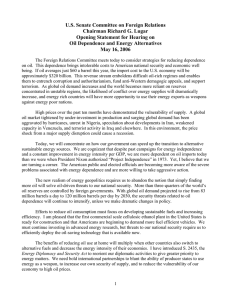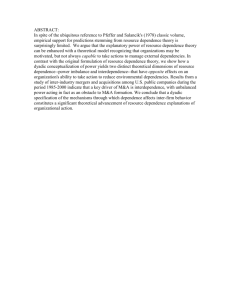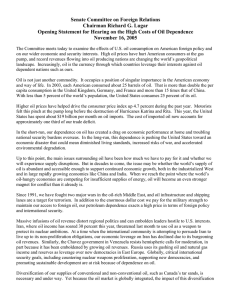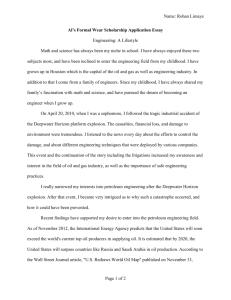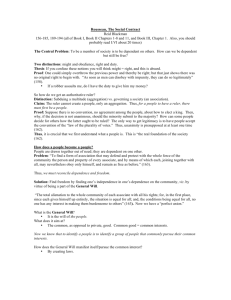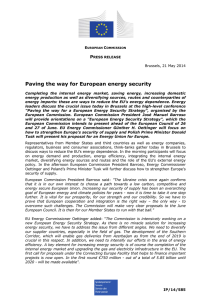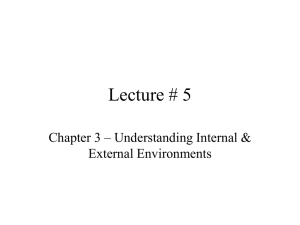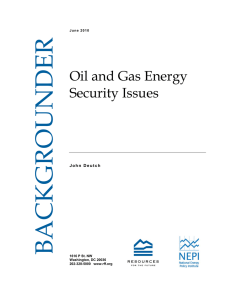U.S. HOUSE OF REPRESENTATIVES – COMMITTEE ON FOREIGN AFFAIRS
advertisement
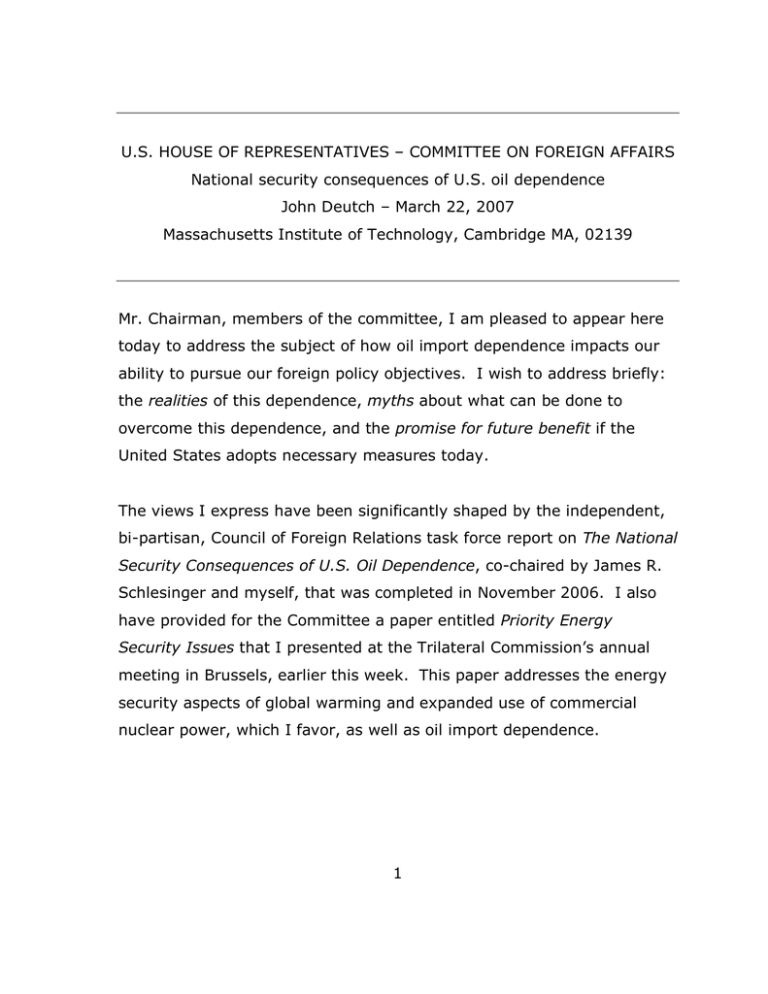
U.S. HOUSE OF REPRESENTATIVES – COMMITTEE ON FOREIGN AFFAIRS National security consequences of U.S. oil dependence John Deutch – March 22, 2007 Massachusetts Institute of Technology, Cambridge MA, 02139 Mr. Chairman, members of the committee, I am pleased to appear here today to address the subject of how oil import dependence impacts our ability to pursue our foreign policy objectives. I wish to address briefly: the realities of this dependence, myths about what can be done to overcome this dependence, and the promise for future benefit if the United States adopts necessary measures today. The views I express have been significantly shaped by the independent, bi-partisan, Council of Foreign Relations task force report on The National Security Consequences of U.S. Oil Dependence, co-chaired by James R. Schlesinger and myself, that was completed in November 2006. I also have provided for the Committee a paper entitled Priority Energy Security Issues that I presented at the Trilateral Commission’s annual meeting in Brussels, earlier this week. This paper addresses the energy security aspects of global warming and expanded use of commercial nuclear power, which I favor, as well as oil import dependence. 1 The realities The United States consumes about 20 million barrels of oil per day, mostly for transportation use, and the Energy Information Administration (EIA) projects that consumption will increase to a level of 27 million barrels per day by 2030, at a growth rate of about 1%. During this period in the EIA’s reference case, our dependence on petroleum imports will increase from 13.7 million barrels per day in 2005 (60% of consumption) to 17.7 million in 2030 (66% of consumption). EIA projects in its reference case that world oil consumption will increase from 80 million barrels per day in 2003 to 118 million barrels per day in 2030. In 2005, OPEC provided about 40% of the world’s oil supply, with 27% coming from the Persian Gulf region; and these shares are projected to remain constant. The first, and most important reality, is that we should expect, at least for the next two decades, the United States to consume greater amounts of petroleum, and to remain dependent on imported oil, much of it from politically fragile and unfriendly states, of the Middle East. Our traditional partners and allies, the developed economies of Europe and Asia, are in the same situation. The second reality is that we will not “run out of oil” but that the real price of petroleum, on average, should be expected to increase. This is an inevitable consequence of the depletion of low-cost conventional oil resources and the need to turn to progressively more costly sources, at 2 first oil from deep offshore and remote regions, then to tar-sands, shale, and synthetic liquids from coal. Our dependence is not new; it has been growing at a steady pace since the 1970s. The proportion of oil coming from the politically unstable Persian Gulf region into the world oil market has been significant for some time. The United States has been unwilling to adopt, and to sustain, policy measures that would slow the trend and begin the long process of a transition to a post-petroleum economy. Our citizens, and their elected representatives, do not wish to sacrifice, in the short-run, the convenience and economic benefits of low-cost energy. Oil import dependence has a serious national security cost. Most fundamentally, dependence on oil imports limits the leverage of the United States and its allies, necessary to achieve its foreign policy objectives. Oil revenues enable producer countries to pursue policies that are not in the interest of the United States. I cite several examples: o Iran. The possibility that Iran might interrupt the 2.5 million barrels of oil per day (of its 4.0 million barrels per day production) that it exports must be taken into account when considering sanctions against Iran for its nuclear weapons activities or for its intervention in the internal affairs of Iraq. o Russia has made clear its intention to use its considerable oil and gas reserves to promote its global interests. The recent actions of Russia to threaten interruption of gas supplies to 3 Eastern European states must give Europe pause, because of its dependence on natural gas imports from Russia. o Venezuela’s oil revenues allow it to pursue domestic and foreign policies that are not in the democratic tradition of that country and which are anti-American. There are four new elements of international oil trade that have troubling national security implications: o Oil demand from large, rapidly growing, emerging economies, such as China and India, are projected to grow dramatically. These states are moving aggressively to “lock-up” oil supplies, in a manner that will increasingly put them in competition with developed economies and create strains in their relations with the United States and other import dependent countries. o A major shift in control of reserves and production is underway in international oil markets from international oil companies to national oil companies (NOCs) of the major resource holders. The NOCs have both commercial and political objectives. Countries such as Iran, Russia, and Venezuela make clear their intent to use their petroleum resources to advance their political interests. o A consequence of the combination of these two elements is a growth in state-to-state agreements between producers and the new consumer countries. These agreements involve elements beyond commercial terms, such as economic or military assistance, and trade concessions. The purpose of the 4 concessions is to establish a political relationship that will secure advantageous access to resources. India and China are eagerly pursuing such state-to-state agreements; China’s activities in Africa, for example, in the Sudan and Angola, illustrate the nature of these agreements. The problem with state-to-state arrangements is that they move away from transparent international oil markets where price allocates available supply to consumers. o As oil is produced in more remote locations, and larger quantities travel longer distances to market, the security of the energy infrastructure becomes of increasing importance. The pipelines, tankers, petroleum storage and processing facilities, the computer systems that monitor and control these operations, are vulnerable, both to natural disasters and to terrorist attack. Industry and government need to devote greater attention to reducing this infrastructure vulnerability. I have addressed oil import dependence but I note that North America is also becoming increasingly dependent on imports of natural gas, in the form of LNG – Liquified Natural Gas. While at present the level of natural gas imports is low, and because there are substitutes for its use in the electricity generating sector there is less reason for concern about the natural gas imports. However, over time, if action is not taken, imports may grow engendering security concerns about natural gas as well. 5 Some myths I mention a few prominent myths about the nature of and possible solutions to the oil dependence problems: o The United States can be energy independent. o Reducing oil imports will reduce the price of gasoline and other oil products for the consumer. o International oil companies control the world price of oil. o There is plenty of low cost oil to be tapped. o The world will run out of oil at some future date certain. o A “Manhattan or Apollo space project” is necessary and sufficient to acquire new technology that will replace fossil fuels. o There is one technical pathway – solar, nuclear, hydrogen, take your pick – that will solve our oil dependence problem. Public leaders – members of Congress, industry executives, educators, and public interest advocates – need to understand the nature of the U.S. energy problem in order to advocate to the public the need for serious and sustained measures to begin the transition away from oil dependence. Public leaders should avoid the temptation to advocate simple solutions that are popular, but unrealistic. 6 The potential for change There are many measures that the United States should take to reduce the adverse consequences of our oil import dependence. Foreign policy measures 1. The large emerging developing economies, notably China and India, should be included in the International Energy Agency (currently restricted to OECD member countries) because of their importance as importing countries. The IEA mechanism is a way to strengthen the common interest of importers in encouraging open and transparent world oil markets and in planning for supply disruptions, through the establishment of national petroleum reserves and other mechanisms. 2. We should encourage countries to move their internal domestic prices toward world oil prices, so as not to subsidize petroleum use. This is especially important in countries such as China and India where artificially low domestic prices contribute to the explosion in demand for private automobile use. 3. Our foreign policy should seek to maintain political stability in the Persian Gulf region. 4. U.S. trade, diplomacy, economic assistance, and technology transfer efforts should continue to be directed to encouraging production of oil and gas in countries outside the Persian Gulf. 5. The United States should take the lead in the creation of new mechanisms for joint contingency planning, setting standards, and conducting exercises that will increase the security of the global energy infrastructure, e.g. ports, pipelines, and facilities. 7 6. The United States should promote good governance in smaller resource holder countries, especially in West Africa, with the objective of seeing that oil revenues improve the economic and social circumstances of the people. Good governance encourages the domestic stability that is needed for uninterrupted production of hydrocarbons. Domestic and foreign energy policy are linked, however the U.S. policy making apparatus typically does not take this linkage into account. Actions that we take with regard to domestic energy policy can advance or harm energy security interests. The key domestic energy policies that have foreign policy benefits are: 1. Adopt measures that will reduce the demand for petroleum products, such as a significant tax on motor gasoline, say $1 per gallon, and other petroleum products; a petroleum product tradable permit scheme; or a more stringent Combined Automobile Fuel Economy (CAFE) standard. Increasing the domestic price of petroleum will not only moderate demand, but the price increase will make new technologies that are less reliant on oil, more economic. 2. Encourage vastly more research, development, and demonstration of new technologies that avoid the use of petroleum. Practical technology will be available in the future, only if significant investments are made today. Both the private sector and the government need to increase their effort. 8 There are promising technologies for both the near and long term. In the relatively near term (five to ten years), hybrids, cellulosic biofuels, advanced hydrocarbon exploration/production techniques, and more efficient engine/fuel systems deserve attention. In the longer term, electricity could be an important source of energy for transportation, both electric cars and for mass transit. This option points to the importance of expanded use of commercial nuclear power in the United States and elsewhere in the world. 3. While energy efficiency brought about by response to higher prices or government regulation is the best way to moderate the anticipated growth in demand, we should also be seeking to increasing our domestic supply of energy. The United States should also consider some increase in hydrocarbon production in the Gulf of Mexico, off the Atlantic and Pacific coasts, and in Alaska. Incremental domestic production is not only our securest source of supply, it also strengthens the U.S. position when it urges other countries to expand production. Serious national security challenges are an unavoidable part of our energy future. We will not make progress if we believe in mythical solutions to the difficult problems brought about by our dependence on oil imports. There are important steps that we can take today that will make our energy future more secure, affordable, and more environmentally friendly. If we do not take these steps today and do not make the required investment in energy supply and end-use efficiency technologies, future generations will a greater burden than is necessary. 9
